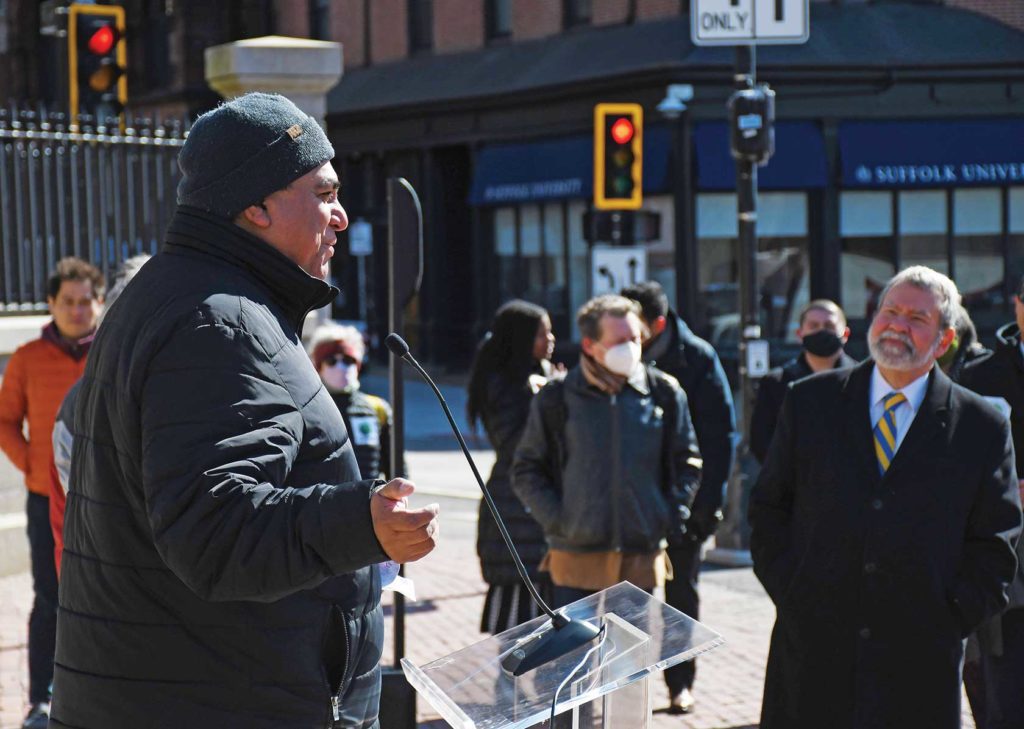Advocates seek state funding for co-ops
Access to capital is a challenge for worker-owned start-ups

For the Dorchester Food Co-op (DFC), providing healthy foods and meaningful jobs to its community is a key element of what the organization wants to do when it opens its store later this year, according to Marcos Beleche, president of DFC’s board of directors.
One challenge remaining in that goal is raising enough funds to get a brick-and-mortar location up and running.
“We already have about $775,000 worth of loans that we’ve agreed to, and we’re sort of maxed out in terms of the debt that we could carry,” Beleche said in an interview.
But a budget amendment in the state legislature could help DFC as it works on funding. An effort sponsored by state Sen. Julian Cyr would create a $4 million capital pool using funds from the American Rescue Plan, the third of three federal COVID-19 relief packages, to create grants and loan guarantees for worker-owned businesses.
“It’d be great to be able to have access to more grant funds,” Beleche said, “because that is less stress on our on our budget, guaranteeing that we potentially could be even more successful in our mission of providing access to healthy foods in that neighborhood, but also being able to create the number of meaningful jobs that we hope to bring to the neighborhood.”
The budget amendment is one of four pieces of a policy platform supported by the Coalition for Worker Ownership and Power (COWOP), a statewide network of organizations working to build supports for worker-owned businesses.

COWOP organizer Sara Assefa speaks to the crowd at the press conference in support of the coalition’s policy platform. PHOTO: AVERY BLEICHFELD
The policy platform also includes support for a bill that would establish the Massachusetts Center for Employee Ownership (MassCEO) within the state’s Office of Business Development to provide education and outreach as well as to support and grow the state’s community of worker-owned businesses.
Another bill included in the platform would require at least 40% of a Massachusetts corporation’s board of directors be elected by the company’s employees to encourage and enable greater workplace democracy.
COWOP’s policy platform also includes a second budget amendment that would create a $250,000 fund to help worker-owned businesses get technical assistance. These funds would allow co-ops to access resources to help figure out the basics of getting their company up and running. Such assistance could range from finding and selecting consultants and construction companies to drawing up contracts and setting up systems like bookkeeping.
“We often found ourselves saying [to our partners], ‘Just bear with us, because [DFC] is our first and probably our only baby, right? You know, we can’t afford to mess up,’” Beleche said. “Things took a little longer. I think that when you when you have a technical system provider that understands your goal, it just allows you to move forward with a bit more focus and agility and comfort.”
Beleche said the funds would have helped as the DFC team searched for technical assistance that matched their mission.
“We wanted to make sure that we are intentional about leading with a racial and economic justice lens,” Beleche said. “We couldn’t just quickly tap your traditional sort of technical assistance resources; we had to work hard and look hard for entities that were mission-aligned to help us with some of these processes.”
At a March 30 press conference outside the State House in support of the policy platform, COWOP organizer Sarah Assefa said the legislative efforts would help communities grow through worker-owned businesses.
“What is worker ownership? It’s a chance for workers to have a say in their business conditions and what they do,” Assefa said. “And it’s also a chance for them to have a piece of the fruit of their labor, to share a piece of the profit. Because when we invest in our community, our community flourishes.”
Boston City Councilor and newly elected state Sen. Lydia Edwards said at the conference that worker-owned businesses are especially important considering the COVID-19 pandemic, which laid bare what she called a “broken” system.
“If anything, we should have learned [from the pandemic] that we need to be investing, doubly so, in cooperatives,” Edwards said. “We need to make sure that cooperatives, the movement, is actually part of our economic future. It is the only way we’re honestly going to bring people across the generational wealth gap that we have seen so much talked about. It is not going to be from corporations down to us — it’s going to be from the people up, owning their own labor.”
Rep. Paul Mark, a co-sponsor of the MassCEO bill, said worker-owned businesses are an important democratic structure that leads to better jobs in the communities in which they are situated.
“We want jobs to be renewable, sustainable, to encourage growth within our communities, to benefit our communities, to profit locally, to not sell up to the highest bidder,” Mark said, “and to get employees engaged and realize that when you go to work, whether in a union or whether you’re a part-owner of your business, you should have a voice in democracy.”
Assefa emphasized that worker-owned businesses are key to building strong communities.
“We know that dignified work is the bedrock for a prosperous community,” Assefa said. “We want to see employment opportunities and jobs and business practices that invest in our community, rather than extract from it.”






